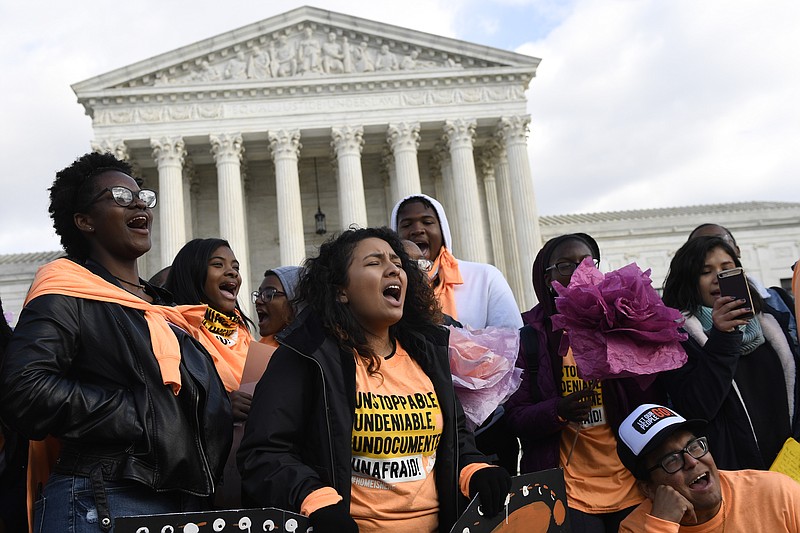In the early days of summer a little more than seven months from now, the United States Supreme Court is likely to make a legally correct but politically troublesome decision. Chances are the court will say the Deferred Action for Childhood Arrivals (DACA) program, an administrative amnesty former President Barack Obama repeatedly said he couldn't implement but did anyway, is against the law.
The time would not be optimum for the Trump administration, which announced in 2017 it was revoking the program but repeatedly has said it wants to make a deal to allow the young people affected by the program to stay in the country. No such deal has been worked out, and even though some polls favor allowing the DACA program immigrants to stay, it's unlikely a deal will be passed before the high court decision and before the country is in the middle of campaign season.
Democrats aren't interested in such a deal because it would appear to be a win for the Republican administration, and they can't have that going into an election year. And besides, it would interfere with their current quest of impeaching the president.
On Tuesday, the high court heard arguments in a trio of cases about Trump's decision to wind down DACA, whose participants are often known as Dreamers.
When the administration announced it was revoking the program two years ago, the move seemed like a no-brainer. The program had been created by executive order, and since Congress and not the president has the power to create immigration law, it appeared the program would be history.
But DACA advocates filed suit to halt the termination of the program, and judges found reasons to agree with them. The administration, the courts said, failed to adequately explain why it chose to end it. Apparently, being illegal wasn't enough.
The courts said the Trump administration failed to explain why the program is bad policy. Why the administration's legal beagles didn't turn around and submit explanations until they got an "A" in the class is unclear. But now the case is in front of the Supreme Court, where one of the lower court opinions now under review said the administration "indisputably can end the DACA program."
The left-leaning news website Vox believes the court has three choices - to narrowly uphold the DACA program, to narrowly agree with the administration to end it, or to conclude the program was illegal in the first place.
Upholding the program would involve simply agreeing the lower courts were right in saying the administration did not give a policy justification why the program should end. Narrowly agreeing with the administration would necessitate acknowledging it was correct in basing its claims to end the program on its legality, or that the administration, in contrary to the lower court decisions, did explain adequately why the program should end. In that scenario, future presidents still might use an executive order similar to Obama's to create a temporary program if they so chose.
What may happen, though, is that at least five justices will say the former president, as he frequently said, could not do what he did.
After all, Obama, to requests he implement immigration reforms, said, "I am not king. I can't do these things by myself." Months later, on the same subject, he said, with "respect to the notion that I can just suspend deportations through executive order, that's just not the case." Several months after that, he acknowledged he couldn't "just bypass Congress and change the (immigration) law myself. That's not how a democracy works."
So, while we don't see how the former president's DACA program will stand Supreme Court scrutiny, such a decision would make for a messy end of June/beginning of July for Republicans.
Trump would be left holding the ball, correct in saying at the outset the program was illegal but looked at as responsible for the estimated 800,000 Dreamers, 15% of whom are said to be homeowners and 6% of whom are said to own businesses, perhaps having to leave the country.
Brought into the country as young children by illegal immigrant parents, they are now said by the American Action Forum to contribute $42 billion to the U.S. economy annually, pay more than $3 billion in federal, state and local taxes, and contribute $2 billion yearly to Social Security and $470 million to Medicare.
Trump said Tuesday if the Supreme Court overturns the program, "a deal will be made with the Dems for them to stay!" Those are easy words today but not so easy to execute early next summer. A deal that allows them to stay but gives in on other areas will cause many Republican voters to stay home in November. And a deal in the first place with a Democratic Party that has impeached Trump in the House but failed to see him convicted in the Senate is not bloody likely.
It could be a summer of discontent for Dreamers and the president.
